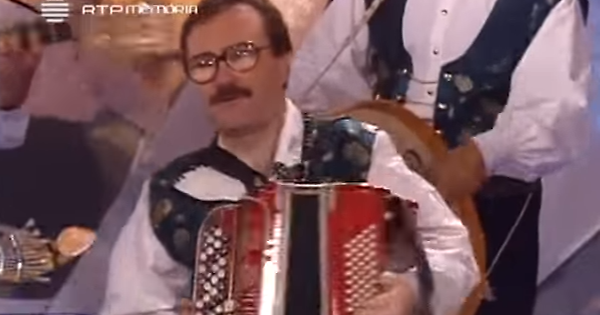VÍTOR REINO, THE MAIN CREATOR OF THE GROUP
Vítor Reino was a man with responsibilities in traditional Portuguese music. He died last May in Almada, aged 64. He was part of the Almanaque, went through the famous group Ronda dos Quatro Caminhos, where he left his mark on the two best albums recorded to date by the band, “Ronda dos Quatro Caminhos” and “Cantigas do Sete Estrelo”, and has been a member since 1985 the Maio Moço group.

In addition, his resume also includes work done in the field of research and collection of traditional material, having collaborated with the specialist in musical ethnology José Alberto Sardinha. For all these reasons, it is surprising that Vítor Reino is the same person who, in the last two works by Maio Moço, “Histórias de Portugal” and “Amores Perfeitos”, has let himself be caught up in the meshes of less rich popular and folk music. Also because this same Maio Moço had recorded two good albums at the beginning of his career, “Inda Canto, Inda Danço” and “Cantos de Marear”, up to the parchments of the past.
Vítor Reino got tired and even said: “I started to come to the conclusion that popular music had a frankly low status in Portugal. Unlike, for example, what happens in Ireland, where there are magazines, books, where your music is accepted by the people, not in Portugal. The radio didn’t care. This determined an ideal in me, which was to create a kind of light music based on our roots”. “After all, something similar to what happens in Brazil”, adds Ana Rita Reino, who has been Vítor Reino’s wife and musical accompanist for many years, in Ronda and Maio Moço.
One of the curious aspects of both “Amores Perfeitos” and the previous “Stories of Portugal” is the didactic aspect present in the respective themes. In the first case, as the title suggests, a summary of Portuguese historical achievements over the eight centuries; in the second, a breviary of some of the most popular Portuguese-speaking writers and poets, all in the tone of “Cartilha Maternal” by João de Deus, with an eye on the less cultured and informed layers of the public.
“That basically is for a reason,” explained Vítor Reino. “Right now, there are hundreds of popular music groups in Portugal and 90 percent of them don’t know what they’re doing. They don’t have any worries, they don’t know how to play, popular music being an excellent field to hide the mediocrity of many people”. Maio Moço just wanted to do it “in a different way than all these groups”.
But groups such as Vai de Roda or Toque de Caixa, to mention just two that the Kingdom appreciated, who do not give up on pursuing a path full of obstacles, in the name of their artistic integrity. The answer couldn’t be clearer: “These are groups that have a cultural role. If there was in Portugal, at an official level, someone who understood its importance, they would be groups to be subsidized, because they have no chance of selling. They completely pass by, because people’s taste is, in fact, far from that type of sounds”.
Groups that, “perhaps, see music as a ‘hobby’”. Vítor Reino pointed out in his moment: “For me it is more than a “hobby”, maybe that’s it”. There is a promise of change in the next album “A return to the origins”, as guaranteed by Ana Rita Reino, who continues the group.
Vítor Reino was blind since childhood, and graduated in Psychology at the Faculty of Psychology and Educational Sciences in Lisbon, being the author of a research work in the area of visual impairments. Music emerged in his path in 1974, first as a guide and performer for occasional projects, then with the aim of a more systematic approach to traditional Portuguese music, which the first groups, Almanaque and Ronda dos Quatro Caminhos, shaped.
He worked on ethnomusical collection with the researcher José Alberto Sardinha, promoted field recordings in different regions of the country, published essays on the Portuguese musical heritage, and promoted the musicographic notation in the score of collected songs and melodies. He also rescued the use of traditional instruments, many of them almost unknown and endangered, such as the rajão, the wire viola and the viola toeira, which he combined with classical instruments and formations, such as the oboe and the string quartet, in the context of recreation of Portuguese traditional music.
As a psychologist and employee of the Ministry of Education, since 1983, he worked at the Resource Center for Visual Impairment and intervened in the training of Special Education teachers. He was also part of the Reading Commission for the Visually Impaired, which elected him in 1998 as a representative on the Braille Commission. His research work in this area was distinguished several times with the Branco Rodrigues Prize, administered by the National Library of Portugal, namely the essays “The Word Blindness: A Study on the Reactions of Three Different Groups” and “Some Considerations of historical, sociological and psychopedagogical order on the Braille System”.
He worked with the Notas e Voltas group from Banco de Portugal, and boosted the choir at José Afonso Secondary School, in Seixal. After his death last May, music researcher João Carlos Calixto mourned Vitor Reino’s death, describing him as “one of the key musicians in recreating our traditions”.






Maio Moço, una joya cultural que celebra las raíces y tradiciones, nos transporta con su esencia única y su profunda conexión con la identidad caboverdiana.
A skilled vocalist can inspire, heal, and uplift others.